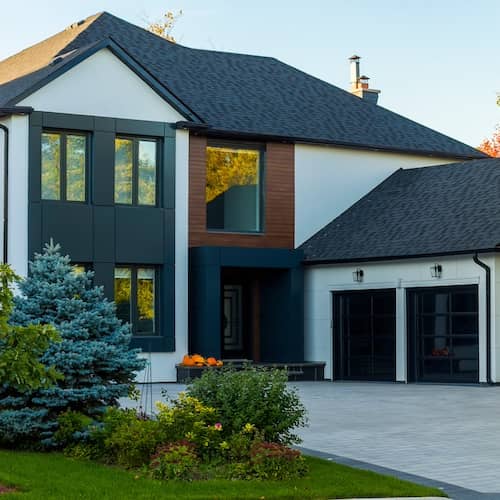How to be a good neighbor
Contributed by Karen Idelson
Aug 27, 2025
•6-minute read
When you’re looking for your dream house, your search likely extends into the neighborhood and surroundings where the house is located. Good neighbors are also a big part of what makes living in an area enjoyable. In a 2024 Nextdoor/Harris Polls study, 71% of respondents said they were interested in meeting more people in their neighborhood.
We’ve put together an overview of what it takes to be a good neighbor that will hopefully help you make new connections in your area and promote a sense of community.
Table of contents
When you think of the qualities that make a good neighbor, what comes to mind? Maybe they’re eager to lend a hand with home-repair projects or let you borrow some butter in a pinch. Or maybe you form a deeper connection, and they become someone you hang out with on the weekend and vacation with during the summer. Regardless, everyone's home is happier when they have a good neighbor, and the best way to find one is often to become one yourself.
Qualities of a good neighbor
There are several qualities that make up being a good neighbor:
- Be helpful: In a 2025 Pew Research Center study, three-quarters of the respondents said they would bring in the mail or do small favors for a neighbor.
- Be trustworthy: Having a kind, trusting relationship with your neighbor can actually lead to increased happiness, according to the 2025 World Happiness Report.
- Be friendly: Knowing a few neighbors can increase well-being and reduce loneliness, according to a 2025 Psychology Today article.
How to be a good neighbor: 6 tips and tricks
Sometimes, the best way to create the feelings you want to experience is to put it out there yourself. Here are some ways to get to know your neighbors.
1. Have a neighborly attitude
Life gets complicated, so imagine how nice it would be to have a friendly soul next door who’s ready to help you when things get difficult. Being that person for others can set the tone for the kind of neighborhood that makes everyday life better.
2. Recognize noise levels
If you live in a community with a homeowners association (HOA), check the rules before planning any gatherings. Many HOAs have specific guidelines about noise levels, event hours, and outdoor activities.
3. Maintain curb appeal
Everyone wants their neighborhood to look good, so do your share and keep up your curb appeal. It keeps the neighborhood looking nice and can help increase property values. Some quick ways to help maintain your curb appeal include:
- Upgrade your entryway with a new coat of paint on your door and upgraded accessories (including an elegant door knocker and attractive address numbers).
- Keep your landscape tidy and well-maintained and add a nice variety of greenery.
- Conduct home repairs. Keep your gutters fixed, roof shingles repaired, and power-wash your driveway and sidewalk.
4. Help keep the neighborhood clean
Organizing a neighborhood cleanup day is a great way to meet people while making your community look spiffy. When everyone pitches in to tackle litter, tend to common areas, or spruce up shared spaces, you're not just boosting curb appeal, you're building a deep level of pride and connection.
5. Be responsible for your furry friends
If you have a pet or bring one to your new home, be sure to keep them leashed during walks, clean up after them immediately, and respect neighbors who might not be as enthusiastic about animals as you are. A well-behaved pet can be a great conversation starter, but an unruly one can quickly strain relationships with the people around you.
6. Discuss issues tactfully
Sometimes, major issues, such as property line concerns, can be avoided with a tactful conversation. If there’s an issue, don’t escalate to something higher before you try to discuss things respectfully.
5. Be responsible for your furry friends
If you have a pet in your home, you should be especially mindful of others, not only for their safety but for your pet’s safety. If your pet is outside in the backyard, keep your gates locked to avoid your furry friend escaping.
If you like taking your pet for walks, remember to keep them on a leash in case there are any young children around. It’s important to make sure others feel comfortable around your pet, especially those who aren’t pet owners themselves.
If you have dogs that bark, give your neighbors a heads up and start working with your pet to improve their habit.
6. Discuss issues tactfully
It’s best to avoid partaking in neighborhood drama, especially if it’s between multiple neighbors. It’s better to remain in a neutral position and avoid adding fuel to the fire. If the issue is unavoidable, you can set a meeting at your home to discuss the matters at hand. If necessary, offer advice on how to best approach a situation as a neutral third party to the issue.
How to maintain a positive neighborhood
Creating and keeping a positive neighborhood doesn’t just happen. It requires cooperation, collaboration, and a good spirit. Here are some tips to help you do just that:
Provide a space for communication
Neighborhoods can become vibrant, tight-knit communities when residents have meaningful ways to connect and engage. Some methods to create this feeling include:
- Regular newsletters that celebrate local achievements, give important news, and provide space for local businesses to advertise.
- Resident meetings where neighbors can share ideas, engage, and discuss important local issues.
- User-friendly portals where residents can communicate online.
- Block parties where people can meet and create strong bonds in a social setting.
- Skill-sharing networks where residents can teach each other everything from cooking to home repair.
When people feel genuinely connected to their neighbors, they're more likely to look out for one another and build the kind of community where everyone thrives.
Welcome new neighbors
Remember the excitement and sense of possibility you felt when you first moved into your neighborhood? Well, people who are new to your area are likely feeling the same sense of potential and fresh beginnings. Go out of your way to help people feel at home in their new place, whether it’s a batch of fresh cookies, a “welcome-to-the-neighborhood” get-together, or just a friendly chat at their front door, they will undoubtedly welcome your efforts to connect.
Help others in need
We all need a helping hand from time to time, so maybe consider being the neighbor who steps up when people are struggling. Whether it’s bringing in packages while someone’s away, offering to shovel snow for an elderly neighbor, or simply checking in on someone who’s been under the weather, these small acts of kindness make everyone's life a little easier and better.
Report criminal activity
One of the most important elements for people when they buy a home is safety. There are ways to get a sense of a neighborhood’s level of safety, ranging from visiting various security-oriented websites to just talking with people in the neighborhood. Once you’re a full-fledged member of the community, it’s important to contact authorities if you witness something that seems suspicious.
Ways to celebrate and thank your neighbors
Living in a great community means you're surrounded by people who make your daily life better. Small gestures of appreciation don't just make your neighbors feel valued, they create a community where everyone feels invested in its success. And when you take time to acknowledge others in your neighborhood, you're improving the place you call home. Consider these ideas.
Host a neighborhood block party
An annual block party is a great way to bring people together and can help create long-lasting friendships with people you might not otherwise meet. You probably won’t have a hard time finding people to pitch in. According to a study by the global nonprofit Points of Light, 95% of those surveyed say it’s important to be involved in the community. Ideas for a top-notch block party include:
- Face-painting
- Cooking competition
- Cornhole tournament
- Magic show
- Potluck
- Bouncy house
- Karaoke
Create welcome baskets for new neighbors
A welcome basket is one of the best ways to introduce yourself to new neighbors and help them feel at home. You can fill the basket with local favorites, ranging from treats crafted at a nearby bakery to coupons for pizza delivery or even just household essentials they might need while they unpack.
Celebrate with a holiday meal
Nearly 40% of those surveyed in a Nextdoor/Harris poll study say they share holiday celebrations with their neighbors, and it’s easy to see why. Whether you’re hosting a potluck or Thanksgiving dinner, organizing a summer barbecue, or simply inviting someone over who might otherwise spend the holidays alone, sharing food creates the kind of warm connections that turn a neighborhood into a true community.
The bottom line: Being helpful, trustworthy, and friendly can position you as a good neighbor
Being a good neighbor is about the little things, such as keeping your lawn tidy and staying quiet after 10 PM, as well as the big things, such as creating genuine connections that make your community feel like home.
Whether you’re organizing a block party, helping someone bring in their groceries, or simply taking time to chat over the fence, these small gestures add up to something much bigger. When you take the first step toward being the neighbor you’d want to have, you’re not just improving your own experience, you're helping build a community where everyone can thrive.
If you’re ready to begin the loan approval process, you can explore mortgage options with Rocket Mortgage® today!

Joel Reese
Joel Reese is a freelance writer who has written about real estate, higher education, sports, and myriad other subjects. He has been published in The Best American Sports Writing series, Details, Spin, Texas Monthly, Huffington Post, Chicago magazine, and many other outlets. His website, ReeseWrites.net, features several samples of his work.
Related resources

1-minute read
Amrock is now Rocket Close℠
Amrock, the nationwide title, mortgage settlement, and appraisal management company, is now Rocket Close.
Read more

8-minute read
What to do after closing on a home
The paperwork has been signed and you’ve got the keys in hand. Now what? Here’s what to expect after closing on a home.
Read more
6-minute read
What is a home warranty and how much does it cost?
A home warranty is a contract covering the repair or replacement of household appliances and home systems. Learn how it works and average plan prices.
Read more